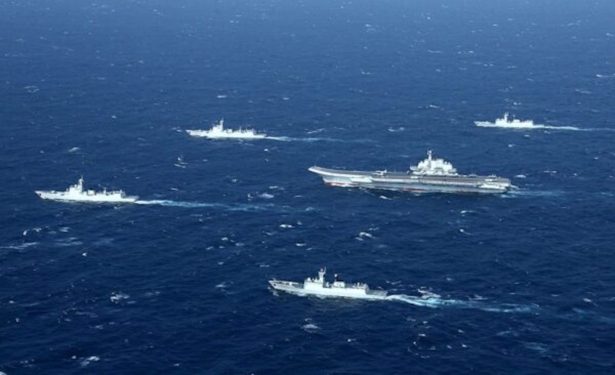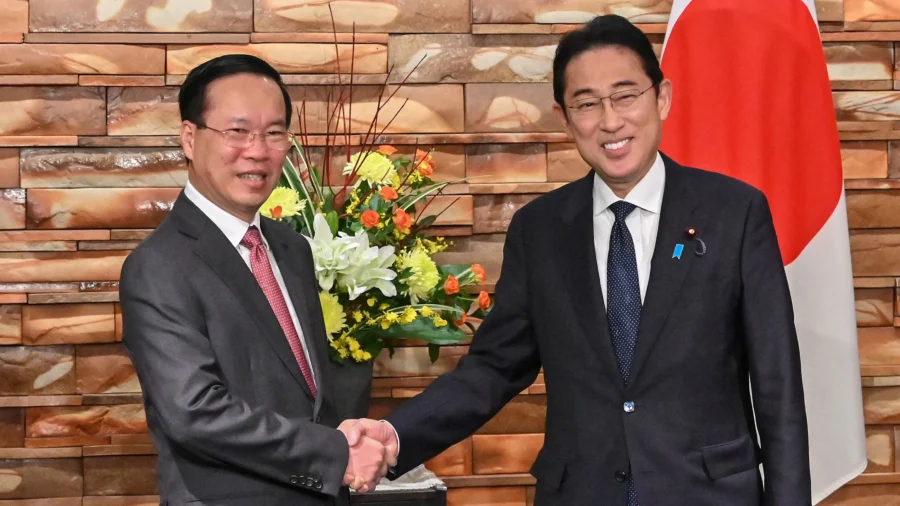From Nov. 27 to 30, Vietnamese President Vo Van Thuong was in Japan on a state visit. He met with Japanese Prime Minister Fumio Kishida, and monarch Naruhito, and delivered a speech in the Japanese Diet, the national legislature. In light of the rising threat posed by the Chinese regime to the Asia-Pacific region, the two countries upgraded their bilateral relationship to a “comprehensive strategic partnership” to collaborate against China.
The two leaders pledged to take their nations’ ongoing cooperation to “new heights and to further expand it to new fronts.” Both agreed to enhance the security collaboration between their countries. They also discussed issues such as Japan’s supply of defense equipment to Vietnam.
In terms of economic cooperation between the two countries, Mr. Kishida expressed that Vietnam serves as a critical supply chain hub and a promising investment destination. To achieve a “Free and Open Indo-Pacific region” (FOIP), Japan will seek to collaborate with Vietnam to revitalize the regional economy. Mr. Vo welcomed Japan’s position.
Furthermore, the two leaders affirmed their willingness to collaborate on issues such as the implementation of the Japanese government’s Official Development Assistance (ODA). Both countries agreed to advance the export of Japanese defense equipment to Vietnam to boost its defense capabilities.
Deepening Ties
On Nov. 29, he delivered a policy speech to the National Diet of Japan, announcing bilateral cooperation in various fields, such as the economy, security, and climate change, through a “comprehensive strategic partnership.” He declared that the two countries would safeguard their interests and open a new chapter for peace and stability.
Mr. Vo vowed to establish Vietnam’s relationship with Japan as “sincere friends and reliable partners.” His message was well-received by Japanese lawmakers across the political aisle.
Japan is Vietnam’s largest provider of government development aid and its fourth-largest trading partner. Japanese investment in Vietnam is also rapidly expanding. As of May, Vietnam ranked fifth among the countries with the most investments by Japanese companies, with about 2,000 Japanese firms currently operating in Vietnam.
The number of Vietnamese visitors to Japan is also increasing, with over half a million Vietnamese students and workers in Japan.
Japan’s Increased Security Aid to Vietnam
Over the last decade, China has strengthened its territorial claims over the South China Sea, and the Chinese regime escalated the dispute using its coast guard to detain and harass Vietnamese fishing boats around Vietnamese-controlled islands. Consequently, the South China Sea has become a significant security concern for Vietnam.
In November 2019, Vietnam published its 2019 National Defence White Paper, which specifically identified tensions in the South China Sea. The white paper highlighted new attempts to unilaterally promote the militarization of the South China Sea in violation of international law. These challenges created new obstacles to Vietnam’s defense of its sovereignty and territory, and it also endangered the interests of other neighboring countries in the region.

Vietnam’s security challenges in the South China Sea are one of the main reasons the country has sought to establish a strategic partnership with the United States and Japan.
Japan’s “Sustainable Ocean Alliance” (SOA) explicitly states that its purpose is to prevent unilateral changes to the status quo by force and to ensure peace and stability in the Indo-Pacific region. To create a desired security environment, Japan is seeking to substantially increase its own defense capabilities and concurrently boost the military capabilities of like-minded countries.
Japan’s military aid focuses on areas including surveillance of territorial waters and airspace, counter-terrorism measures, communication satellites, cruisers, and the construction of dual-use ports. This year’s SOA provides military aid to Vietnam, which is viewed as a countermeasure against the Chinese regime’s military expansion.
Vietnam shares a land border with China, overlooking the South China Sea. Vietnam and the Philippines form a critical surveillance and control point for vessels passing through the Strait of Malacca. Moreover, Vietnam serves as the southernmost point of America’s first island chain, which is a vital strategic location capable of restricting and countering China’s expansionist policies in the region.
Both Vietnam and the Philippines have territorial disputes with China, but as smaller countries, it is difficult for them to confront the Chinese regime, which is the reason why both countries are seeking stronger ties with the United States and Japan. Japan also has strategically allied with Vietnam and the Philippines to form a robust coalition to isolate and contain China’s influence.
In September, President Joe Biden’s visit to Vietnam signaled a shift in the relationship between the United States and Vietnam. Vietnam was once an enemy of the United States, and the two countries engaged in the lengthy Vietnam War. However, the relationship has been improving in recent years due to increasing threats from China.
The Chinese regime is aggressively expanding its military presence in the Taiwan Strait, the South China Sea, and the East China Sea, seeking to reshape regional geopolitics through its military might.
To counter China, the United States desires Vietnam, its former adversary, as its ally. Vietnam requires U.S. assistance to challenge the Chinese regime in its territorial disputes. Consequently, the regional geopolitics elevated bilateral relations between the two countries to another “comprehensive strategic partnership.” In reality, it was the Chinese regime that prompted the two countries to come together.
Today, Vietnam has emerged as a crucial stronghold for the United States and Japan, with both countries upgrading their ties with Vietnam to a “comprehensive strategic partnership.”
From The Epoch Times

